A Clinician’s Reflection on Black Men, Mental Health, and Suicide
For over eight years, I worked in a court‑mandated anger management program, and 95% of my caseload was male.
I sat across from brothers carrying everything from unprocessed rage to profound grief. I also ran mental health programs in three men’s homeless shelters across Brooklyn until COVID shut them down.
There, suicide came up repeatedly… spoken in low tones, sometimes as a metaphor but always present.
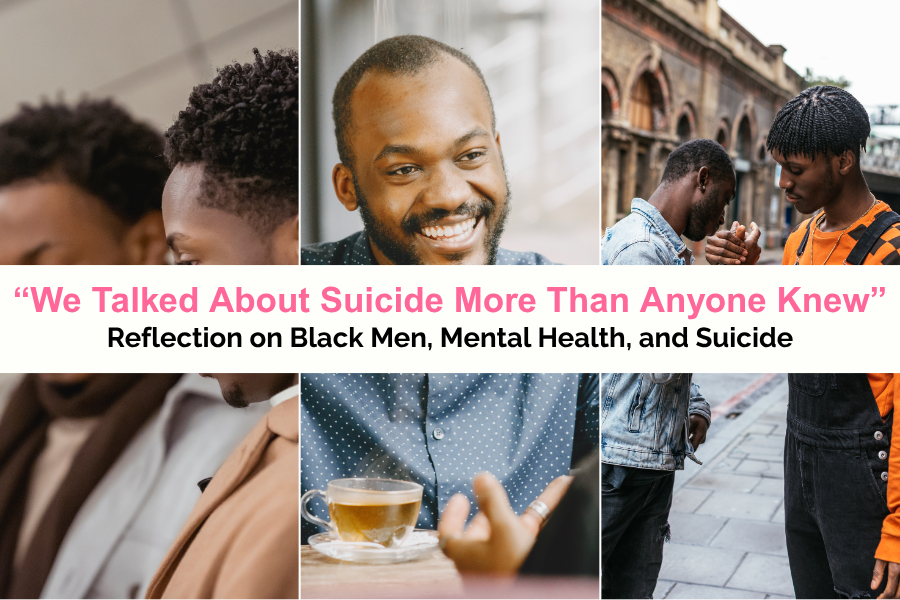
Currently, I have been serving as a POPPA/NYPD clinician for eight years, where suicide among officers remains a devastating and persistent crisis that has spanned more than two decades.
These men – Black, Brown, working‑class, homeless, uniformed, incarcerated opened up about wanting to die in ways the world never hears.
That’s why I’m writing this.
The Crisis of Suicide Among Black Men
When people think of suicide, they often imagine a “white issue.” But the data tells a different story for Black men, especially younger generations.
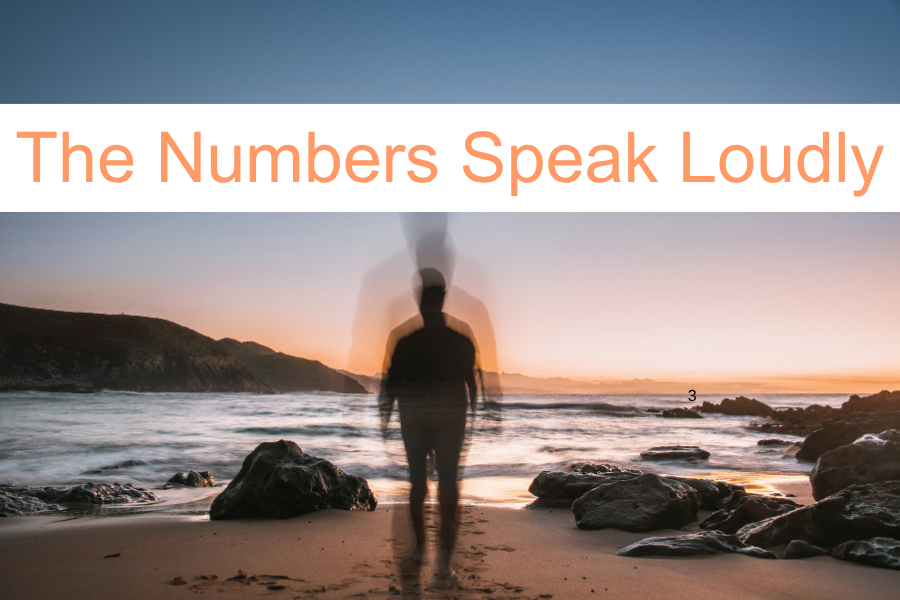
In 2022, suicide was the third leading cause of death for Black Americans ages 10–24. (Source)
Rates are rising fast.
According to data through 2017, self‑reported suicide attempts among Black high school students increased by approximately 73%, while injuries requiring medical care from those attempts rose by about 122% among Black adolescent males. (Source)
Additionally, Black children aged 5–12 are almost twice as likely to die by suicide compared to their White peers. (Source)
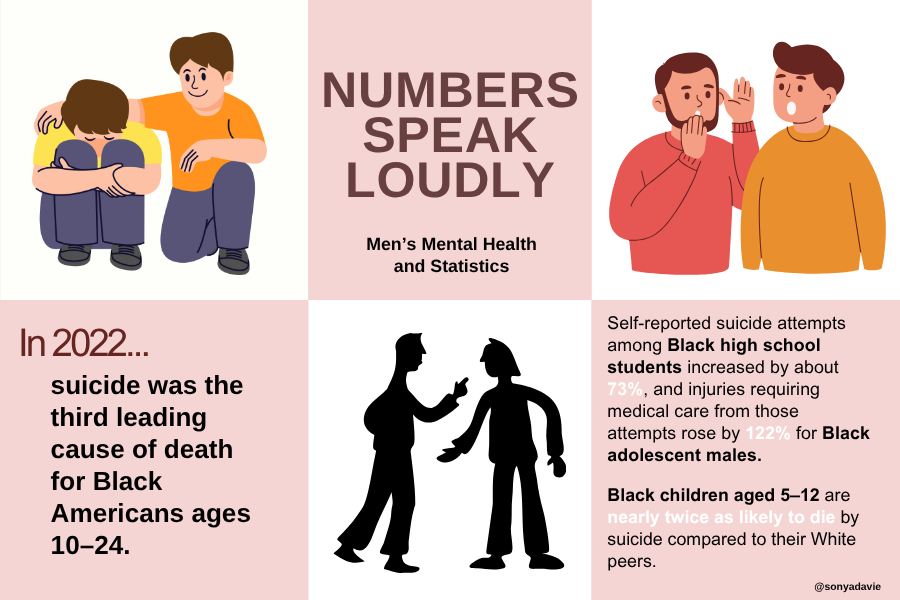
These tragedies often go unseen. But in my work, from homeless shelters in Brooklyn to city police precincts, Black men’s pain is visible, persistent, yet silenced. That silence has consequences.
What’s Driving the Crisis?
1. Structural Racism & Chronic Stress
Systemic racism is trauma in motion—manifesting through profiling, poverty, incarceration, and unequal access to healthcare. This daily exposure creates a relentless stress that accumulates over time, leaving Black men with psychological wounds that too often go untreated.
2. Cultural Silence Around Mental Health
In far too many households, phrases like “man up” or “don’t show weakness” still rule. Vulnerability is seen as unacceptable inside the community and punished outside of it.
Many men I’ve worked with described suicide as the only moment they felt control… a final escape beyond the world’s restrictions.
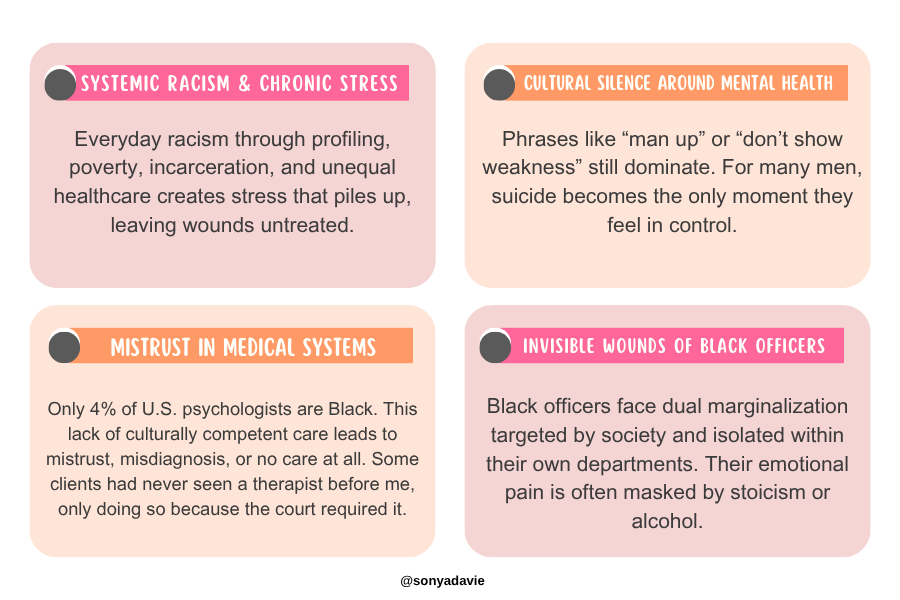
3. Mistrust in Medical Systems
Only 4% of U.S. psychologists are Black, and culturally responsive care is underrepresented. (Source)
That leads to mistrust, misdiagnosis, or no care at all. Some of my clients had never sat with a therapist before me and only did so because the court required it.
4. The “Invisible Wounds” of Black Officers
Working with NYPD officers through POPPA has shown me that racialized trauma doesn’t disappear with the badge.
Black officers often live with dual marginalization targeted by society and isolated within their own departments. In a culture that prizes resilience and performance, their emotional wounds are frequently buried beneath stoicism, long shifts, or a drink at the end of the day.
Where Do We Go From Here?
The men I’ve worked with have taught me something profound: when they are given safety, respect, and space—they speak.
But healing can’t rely on one‑on‑one therapy alone. True change requires community‑based healing and systemic transformation.
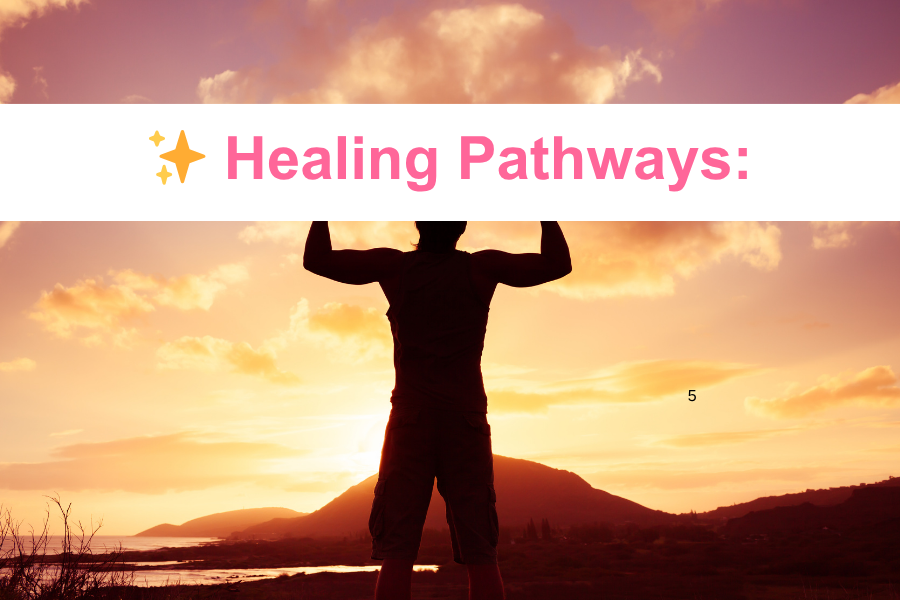
🏘️ Community‑Led Therapy Spaces
Culturally attuned, community‑based spaces are essential for creating safe environments where Black men can process trauma and begin to heal.
🚗 Culturally Responsive Outreach
Mental health support must meet men where they are… whether in trusted spaces like barbershops, churches, or fraternities, or within workplaces and social networks… rather than expecting them to seek out traditional clinical settings.
🔄 Mentorship & Group Healing Circles
Shared recovery and support groups foster trust, accountability, and hope, especially for those navigating trauma or re‑entry after incarceration. Healing deepens when men witness and support one another’s journeys.
🏛️ Policy & Funding Reform
Equitable investment in Black mental health is urgent. Expanding access to culturally competent care, diversifying the mental health workforce, and prioritizing community‑centered initiatives can create lasting systemic change.
🗣️ Ending the Silence
During Minority Mental Health Awareness Month (and beyond) we must move past performative hashtags and quick fixes.
It’s time to:
- Stop criminalizing Black men’s pain.
- Expand access to culturally competent care.
- Reimagine what safety, vulnerability, and healing truly look like for Black men.
They deserve more than clinical checkboxes…
they deserve dignity, an attentive audience, and community-centered care.
Because their lives matter. Their minds matter. Their stories deserve to be heard.
📚 Books That Help Men Heal
I want to share two transformative books by Pervis Taylor III that offer powerful tools for men navigating emotional healing and trauma:
1. Surthrival Mode (Kindle Edition)
Surthrival Mode is a how-to guide that helps men move beyond mere survival to thriving emotionally and mentally.
Using the “4 A’s” — Acknowledgement, Acceptance, Articulation, and Alchemy — Taylor shares his own story of overcoming abuse, depression, and low self-esteem. The book offers actionable steps for men to reclaim their mental health and relationships with power, intimacy, and vulnerability.
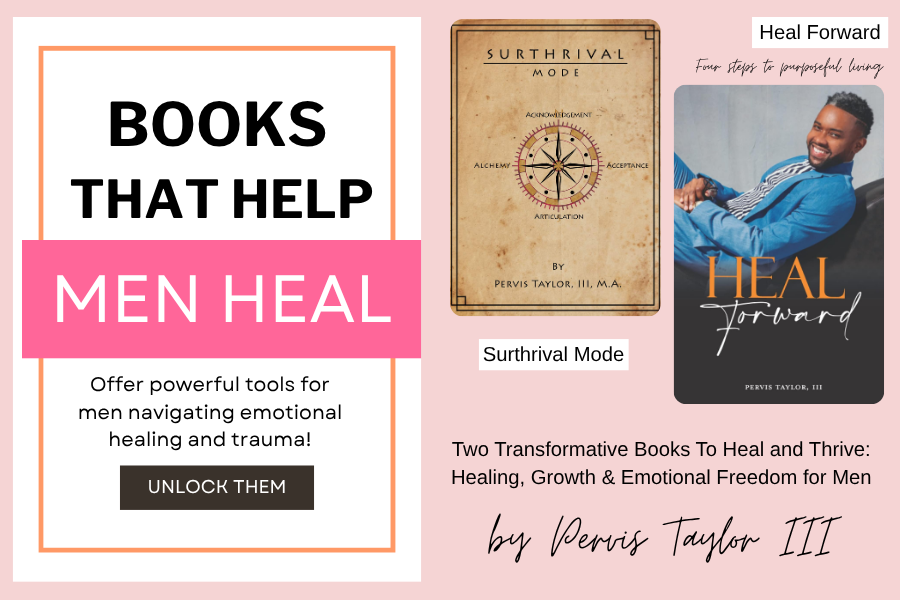
2. Heal Forward: Four Steps to Purposeful Living (Paperback)
In this follow-up to Surthrival Mode, Pervis Taylor guides men on a continued healing journey through the “4 V’s” — Vision, Verified, Voice, and Vulnerability. This book emphasizes that healing isn’t linear but continual. Taylor encourages men to heal from their past to build a beautiful and empowered future.
Both books are vital reads for men seeking strength, purpose, and emotional freedom.
✨ My Final Words
Black men across socioeconomic lines, across roles carry stories of survival, grief, and perseverance. We have to create spaces where those stories can be heard, honored, and healed.
Therapy is part but not all of the solution. When mental health care is community-rooted, culturally responsive, and systemically supported… healing becomes collective.
Thank you for bearing witness. Thank you for staying. This conversation matters.
Related Post – The Truth About Men and Anger: Signs, Causes, Effects, and How to Manage It
+ show Comments
- Hide Comments
add a comment